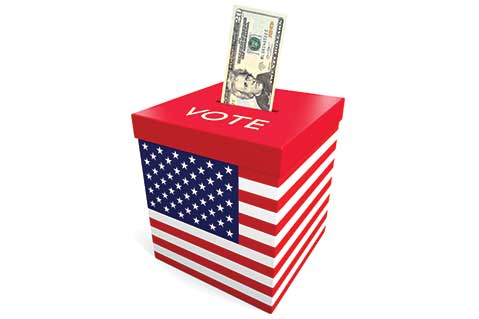Awards March 10, 2020
Tips for Selling to the Political Market
The appetite for election promos make it a compelling market for distributors.
Any election year makes the political market a ripe option for distributors, and the good news is that while classic standbys (yard signs and buttons) remain supremely popular, there’s room for newer trends, too, like stickers and pop sockets for phones.
In apparel, you can’t go wrong with full-color American-made wearables like hats, shirts and fanny packs. “There’s been an overwhelming rush to put political messages on baseball hats,” says Mitch Cahn, president of Newark, NJ-based Unionwear (asi/73775). “Hats are really the perfect medium for a political message. Most of the primaries occur in cold-weather states in cold-weather months, so any other kind of wearable is going to get lost under a jacket.”

Anthony Carpenter, owner of The Branded Creation by Proforma (asi/300094) in Sugar Land, TX, says there are some high sellers people tend to overlook. Cloth backdrops for tables and photo-heavy events should be a priority suggestion to customers. These provide visual representations of the campaign logo without overtly being on a product or forcing a person to carry something with them. Children’s products are also a prosperous item for the political market. For example, campaign events at a county fair with interactive things like footballs and toys will draw kids to candidates’ tables, and “their parents will naturally follow along,” Carpenter says.
The first step to selling in the political market is figuring out exactly who you want to work with. There’s more than just major politics at play here – hundreds of candidates run for local offices, plus some motivated individuals or activism groups may want merchandise as well. You’ll want to start with the campaign manager or treasurer first, says Cliff Quicksell, vice president of marketing at Top 40 distributor iPROMOTEu (asi/232119). Depending on the size of the campaign, who handles promotional product orders might be different. You can usually find the information, or at least a general point of contact, on the campaign or group website or with the local board of elections.
If that doesn’t work for you, get out there and pound the pavement. Carpenter says to view it like a nonprofit. “You have to go in and resolve to be seen around,” he says. “All of a sudden, you start getting introduced to these different candidates and who’s running their campaigns. That’s how it snowballs.”
Once you establish a reputation and a specialty in the market, people will be more apt to contact you, says Cary Heller, vice president of sales at Keego Harbor, MI-based All USA Clothing.
However, the political market does bring some unique situations. Candidates want to please their constituents, so they take into consideration things like where and how the product is made and how you might handle sensitive information. Watch for these special situations:
Made in America: The stress on manufacturing location means USA-made products are the go-to solution. “It’s the one thing that represents what the candidate is all about,” Heller says. “They all care about America and don’t want their T-shirts saying, ‘Made in China.’ It’s the one thing both sides can agree on.”
Site Visits: Cahn notes that Unionwear regularly gets requests for site visits from end-users, which rarely happens with non-political orders. “They don’t want a manufacturer of a wearable that’ll come back and embarrass their campaign,” he says. “They usually come by with a representative from the campaign to make sure that the product is being manufactured in a domestic facility before anything saying otherwise comes out. No candidate ever wants to see a video of someone finding out their products are manufactured in China or Mexico, but it happens every election cycle.”
Unions: Depending on their platform or beliefs, some customers will want union-made products, and some customers will want products with no union ties whatsoever. Save yourself some trouble and ask beforehand what they’re looking for.
Moment Merch: Little sound bites spurring a promotional products frenzy have become the norm – think about the Trump-branded plastic straws or “Cocaine Mitch” McConnell stickers. Don’t expect that to slow down any time soon; expect to see more of it and be ready for a quick-moving sale to maintain speed with the news cycle.
Payment: Billing early and getting at least partial payment, if not full payment, up front is critical. Quicksell’s company once got burned for about $10,000 when a candidate didn’t win, owed them money and then went bankrupt. “The distributor’s going to get stuck with an order if the candidate drops out of the race before the stuff is billed,” Cahn says. – Jennifer Billock
Watch This
At the ASI Power Summit, Christl Mahfouz of Ace Specialties (asi/103553) shared her story of how she became President Trump’s go-to distributor for promotional products. Watch the full session below:
